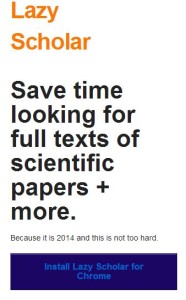Thought provoking post this week by Aaron Tay on his blog Musings About Librarianship:
Lazy Scholar – Interesting Chrome extension – a review and comparison with other library find full text options
Aaron discusses Lazy Scholar, a Chrome browser extension that streamlines discovery of free full-text using Google Scholar. From an abstract found on a publishers site, researchers can query Google Scholar with one click in their Chrome address bar. This allows them to discover more free full-text – and also makes it easier to bypass the library altogether.
From the post:
Every librarian worth his salt knows that despite the rise of web scale discovery services, Google and Google Scholar are often the go-to tools of researchers.
In libraryland, we have basically solved the issue of users searching Google Scholar and linking to full text via Google Libary Link Program.
But what happens if users just Google (or link via other means) and land up on the publisher page, or some other indexing service that has no full text like RePec, or PubMed?
Our solutions tend to be either adding the proxy (via Proxy bookmarklet is most popular though there are many many ways), or the more powerful Libx plugin , which allows among other things to leverage unique identifiers like DOI, PMID and use the library’s link resolver to find the appropriate copy.
Lazy Scholar’s approach is different. It attempts to locate the free copy first, though it does give you the option to add the proxy similar to proxy bookmarklet as well as leverage the link resolver via Scraping library links in Google Scholar. Arguably, in many ways, we can see how this plugin reflects the mindset of a researcher. Why go through the library with complicated passwords when you can get the free copy first?
Why indeed? I admit I have been guilty of downloading free PDFs that are posted on the open web. The bottom line is: people want to get to stuff, and they want to get there as quickly and easily as possible.
Does this kind of tool represent a threat to libraries? I don’t think so. Libraries don’t need to “win” the discovery battle with Google – instead, we should focus on making our resources legally available on the open web. To that end, tools like Lazy Scholar may in fact be a help, not a hindrance.
